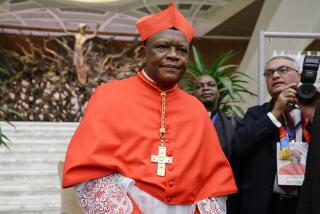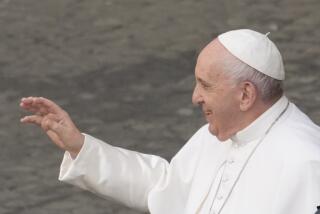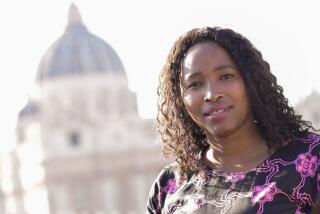Synod Ends With Call for Reunification : Catholicism: Pan-European gathering of 137 bishops stresses ‘new evangelization.’
- Share via
VATICAN CITY — Papering over divisions with other Christian churches, Roman Catholic bishops from the Atlantic to the Urals appealed for Continental re-evangelization Saturday at the close of a historic pan-European synod.
The synod, called by Pope John Paul II to evaluate church direction after communism’s fall, termed “new evangelization” an “urgent task” aimed at reuniting peoples no longer divided by ideological and totalitarian barriers.
“Re-evangelizing is not a program for the so-called restoration of a Europe of former times but helps uncover its Christian roots and to build a more profound civilization, clearly more Christian and therefore more richly human,” the 137 bishops said in a declaration. The document concluded two weeks of deliberations marking the first time in history that church leaders from all parts of Europe had reasoned together.
Critics have attacked the synod as an attempt by John Paul to launch a “new crusade” at the expense of other faiths also seeking to reorganize in the former Soviet Union and other Eastern European countries, where religion has resurged after decades of officially imposed atheism.
The bishops’ declaration sought to minimize differences, noting that “European culture has grown from many roots” and acknowledging Protestant, Jewish and Islamic influences.
“But nobody can deny that the Christian faith goes back to the permanent and radical foundation of Europe. In this sense we speak of ‘Europe’s Christian roots,’ but not to imply that Europe and Christianity are one and the same thing,” the declaration said.
In his closing remarks to the synod Friday, John Paul stressed the “many menaces and tensions, real and potential,” that mark changing Europe’s search for political and economic unity. The Pope seeks to instill common moral, ethical and spiritual ground between West Europeans wooed by materialism and East Europeans weaned in societies without churches.
“Will the church be able to be a promoter of true peace?” the Pope asked rhetorically. “Will she be able to transfer reconciliation, with which God has reconciled the world to himself, to the interpersonal and international dimensions? This is a key question for the future of Europe and of the world. A fundamental question also for the mission of the church.”
John Paul has moved quickly to reassert church hierarchies in the East, sparking tensions with larger Orthodox churches there. A number of Orthodox patriarchs snubbed a papal invitation to attend the synod to protest what they consider Catholic poaching on their turf. While the synod deliberated, the Vatican, in a masterstroke of poor timing, released detailed objections to a 1981 joint report with Anglican leaders over ecumenical prospects between the two faiths.
The final declaration, however, devoted an entire section to “the need for dialogue and cooperation with other Christians, Jews and all who believe in God,” echoing the Pope’s own call to avoid “preconceptions which are often the source of bitterness and fruitless mutual accusations.”
“The re-evangelization of Europe is the common task of all Christians,” the final declaration said, observing “the complementary traditions of Eastern and Western Christianity . . . ‘one soul breathing with two lungs.’ ”
In response to the resurgence of anti-Semitism in Eastern Europe, the report called for national churches to “promote positive relationships with the Jewish people in preaching and educational work.”
“An extremely important factor in the construction of a new order in Europe and in the world is inter-religious dialogue, above all with our ‘elder brothers,’ the Jewish people, whose faith and culture are an element of human development in Europe,” the report said. “After the terrible Holocaust of our century, for which the church feels a profound grief, new attempts have to be made to acknowledge Judaism more profoundly, rejecting all forms of anti-Semitism, which are contrary either to the Gospel or to natural law.”
Not everybody left Rome convinced of the church’s willingness to cooperate with other religions in a search for a spiritually cohesive new Europe.
Non-Catholic participants at the synod noted that only one proposal from non-Catholics was included in the final document, and some said they had hoped for greater recognition of an interfaith role in re-evangelization.
More to Read
Sign up for Essential California
The most important California stories and recommendations in your inbox every morning.
You may occasionally receive promotional content from the Los Angeles Times.










